Badlands of Dakota
Cast & Crew
Alfred E. Green
Robert Stack
Ann Rutherford
Richard Dix
Frances Farmer
Broderick Crawford
Film Details
Technical Specs

Synopsis
During the South Dakota gold rush of 1876, the city of Deadwood becomes the latest boom town. Bob Holliday, a saloon owner and the most feared man in town, sends his younger brother Jim to their hometown of St. Louis to bring back his young fiancée, Anne Grayson. On the steamship back to Deadwood, Jim and Anne fall in love. In the city of Plainview, Jim and Anne are caught in an attempted ambush of their fellow passenger, Wild Bill Hickok. Jim pretends to be shot and Anne proclaims her undying love. Arriving in Deadwood, Anne is greeted by a huge celebration and shown the "new home" that Bob has built for her. Jane, Bob's tomboy sweetheart in Deadwood, enters the house and threatens Anne, only to be told that Jim and Anne are married. Back at the saloon, Bob tries to dump Jane, and the spurned woman tells him of his brother's deception. A deranged Bob slaps Jim around, then tells Anne that she can get an annulment, which she refuses to do. That night, a drunken Bob joins forces with outlaw Jack McCall, whose gang masquerades as Indians to hold up the local stagecoaches. After their first holdup, Hickok recognizes McCall as the man who shot the Kansas City Kid in the back. Later, at a town meeting, General George Armstrong Custer informs the town leaders that they must learn to defend themselves against Indian attacks. With Bob's encouragement, the leaders elect an absent Jim as the town marshal. Jim's ineptness at the job quickly makes him a laughing stock, and Anne plans their return to St. Louis. Jim, however, refuses to give up on the West or himself. First, he arrests Jack for shooting up the Bella Union. Then, the leader-less "Indians" attempt to hold up another stagecoach, but are thwarted when Jim arrives with a posse. After the ensuing shootout, Jim finds his father's watch and realizes that Bob is part of the gang. Just as Jim is about to quit as marshal, he learns that McCall has escaped from jail and murdered Hickok by shooting him in the back. The posse is about to go after McCall when Jane arrives, warning them of an impending attack on the town by real Indians. While the Indians attack the town, McCall and his gang attempt to rob the bank. Jim breaks up the robbery but hasn't the courage to arrest his brother. Bob, still embittered, is about to shoot Jim when Jane arrives and shoots the outlaw brother instead. When McCall tries to shoot Jim in the back, the wounded Bob shoots McCall, then dies in Jane's arms. The cavalry arrives and the real Indians are driven away. Afterward, Custer congratulates the town on its brave defense, then heads off to Little Big Horn amidst cheers and "good luck" wishes.

Director
Alfred E. Green
Cast

Robert Stack

Ann Rutherford
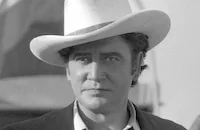
Richard Dix

Frances Farmer
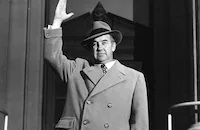
Broderick Crawford
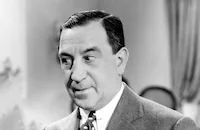
Hugh Herbert
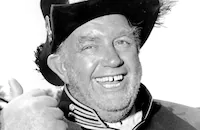
Andy Devine

Lon Chaney Jr.

Fuzzy Knight

Addison Richards
Dwight Latham
Walter Carlson
Guy Bonham
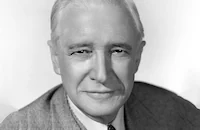
Samuel S. Hinds
Carleton Young

Glenn Strange
Harry Johnson Sr.
Harry Johnson Jr.

Bradley Page
Don Barclay
Willie Fung
Joe King

Emmett Vogan
Noble Johnson
Dick Alexander

Harry Cording
George Sherwood
George H. Reed
William Ruhl
Alan Bridge
Ernie Stanton
Jack Lawrence
Forrest Taylor
Bob Barron
Charles King
Frank Brownlee
Frank O'connor
Paul Bryar
Crew
Bernard B. Brown
Stanley Cortez
R. A. Gausman
Gerald Geraghty
Charles Gould
Frank Gross
Vernon Keays
Jack Lawton
Harold H. Macarthur
Victor Mcleod
Jack Otterson
Robert Pritchard
Carson Robison
H. J. Salter
Harold Shumate
William Sickner
Ray Taylor
George Waggner
Vera West

Film Details
Technical Specs

Articles
Robert Stack, 1919-2003
Stack was born in Los Angeles on January 13, 1919 to a well-to-do family but his parents divorced when he was a year old. At age three, he moved with his mother to Paris, where she studied singing. They returned to Los Angeles when he was seven, by then French was his native language and was not taught English until he started schooling.
Naturally athletic, Stack was still in high school when he became a national skeet-shooting champion and top-flight polo player. He soon was giving lessons on shooting to such top Hollywood luminaries as Clark Gable and Carol Lombard, and found himself on the polo field with some notable movie moguls like Darryl Zanuck and Walter Wanger.
Stack enrolled in the University of Southern California, where he took some drama courses, and was on the Polo team, but it wasn't long before some influential people in the film industry took notice of his classic good looks, and lithe physique. Soon, his Hollywood connections got him on a film set at Paramount, a screen test, and eventually, his first lead in a picture, opposite Deanna Durbin in First Love (1939). Although he was only 20, Stack's natural delivery and boyish charm made him a natural for the screen.
His range grew with some meatier parts in the next few years, especially noteworthy were his roles as the young Nazi sympathizer in Frank Borzage's chilling The Mortal Storm (1940), with James Stewart, and as the Polish flier who woos a married Carole Lombard in Ernst Lubitsch's To Be or Not to Be (1942).
After serving as a gunnery officer in the Navy during World War II, Stack returned to the screen, and found a few interesting roles over the next ten years: giving Elizabeth Taylor her first screen kiss in Robert Thorp's A Date With Judy (1948); the leading role as an American bullfighter in Budd Boetticher's The Bullfighter and the Lady (1951); and as a pilot in William Wellman's The High and the Mighty (1954), starring John Wayne. However, Stack saved his best dramatic performances for Douglas Sirk in two knockout films: as a self-destructive alcoholic in Douglas Sirk's Written on the Wind (1956), for which he received an Academy Award nomination for supporting actor; and sympathetically portraying a fallen World War I pilot ace who is forced to do barnstorming stunts for mere survival in Tarnished Angels (1958).
Despite proving his capabilities as a solid actor in these roles, front rank stardom oddly eluded Stack at this point. That all changed when Stack gave television a try. The result was the enormously popular series, The Untouchables (1959-63). This exciting crime show about the real-life Prohibition-era crime-fighter Eliot Ness and his G-men taking on the Chicago underworld was successful in its day for several reasons: its catchy theme music, florid violence (which caused quite a sensation in its day), taut narration by Walter Winchell, and of course, Stack's trademark staccato delivery and strong presence. It all proved so popular that the series ran for four years, earned an Emmy for Stack in 1960, and made him a household name.
Stack would return to television in the late '60s, with the The Name of the Game (1968-71), and a string of made-for-television movies throughout the '70s. His career perked up again when Steven Spielberg cast him in his big budget comedy 1941 (1979) as General Joe Stillwell. The film surprised many viewers as few realized Stack was willing to spoof his granite-faced stoicism, but it won him over many new fans, and his dead-pan intensity would be used to perfect comic effect the following year as Captain Rex Kramer (who can forget the sight of him beating up Hare Krishnas at the airport?) in David and Jerry Zucker's wonderful spoof of disaster flicks, Airplane! (1980).
Stack's activity would be sporadic throughout the remainder of his career, but he returned to television, as the host of enormously popular Unsolved Mysteries (1987-2002), and played himself in Lawrence Kasden's comedy-drama Mumford (1999). He is survived by his wife of 47 years, Rosemarie Bowe Stack, a former actress, and two children, Elizabeth and Charles, both of Los Angeles.
by Michael T. Toole

Robert Stack, 1919-2003
Quotes
Trivia
Notes
While the Variety review refers to actress Frances Farmer's character as "Calamity Jane," she is never called that name in the film. The film contained three songs by Carson Robison, but their titles were not found in any contemporary source. According to Universal press materials, location manager Jack Lawton, director Ray Taylor and assistant director Charles S. Gould covered 6,000 of South Dakota highways while scouting locations and backgrounds for this film. Hollywood Reporter reported on June 24, 1941 that actress Miriam Hopkins had agreed to star in the picture, only to state two days later that she had left the planned production, as she was unhappy with her role in the final draft of the script. Hollywood Reporter reported in September 1941 that the film had set a box office record at the Rialto theater in New York City.
John Henry "Doc" Holliday (1852-1887), though trained as a dentist, became infamous for his exploits as a gambler and gunman in the old West. He was a participant, along with Wyatt Earp, in the 1881 gunfight at the O.K. Corral in Tombstone, AZ, and helped Luke Short during the Dodge City War of 1883. He died of tuberculosis and alcoholism in 1887. There have been many films featuring Holliday as a character, among them the 1946 John Ford-directed Twentieth Century-Fox release My Darling Clementine, (see below); the 1957 Paramount film Gunfight at the O.K. Corral, starring Burt Lancaster and Kirk Douglas, directed by John Sturges; the 1993 Buena Vista Pictures release Tombstone, directed by George P. Cosmatos and starring Kurt Russell and Val Kilmer; and the 1994 Warner Bros. film Wyatt Earp, directed by Lawrence Kasden and starring Dennis Quaid as Holliday.
Calamity Jane, a nineteenth-century frontier woman whose real name was Martha Burke (1852-1903), was known chiefly for her habit of donning men's clothes and her marksmanship. In the late 1890s she appeared in Wild West Shows and performed in the 1901 Buffalo Pan American Exposition. For biographical information on Wild Bill Hickok, please refer to Wild Bill Hickok Rides .
Modern sources include Eddie Dew, Kermit Maynard, Edward Fielding, Hank Bell, Chuck Morrison, Jane Farley, Jeanne Kelly and Carl Sepulveda in the cast.














